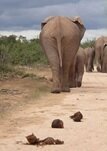ENDOCRINE RESEARCH LABORATORY
The Endocrine Research Laboratory (ERL) was established in 2009 as part of a collaborative initiative by the Faculty of Veterinary Science and the Mammal Research Institute (MRI), with the vision of providing a basis for behavioural and wildlife endocrine research in South Africa and further afield. The ERL is the only laboratory of its kind in southern Africa and is highly respected for conducting endocrine research on both free-roaming and captive animals. At present, the ERL is involved in approximately 20 projects at any given time, has more than 25 national and international collaborations and has held two South African workshops for non-invasive hormone monitoring. A total of 50 post-graduate studies have been supported by the ERL resulting in over 80 peer reviewed scientific articles.
In 2017 Professor André Ganswindt (MRI Director and Founder of the ERL) relocated the laboratory from the Faculty of Veterinary Science (located 18km away from the central campus) to the Faculty of Natural and Agricultural Sciences. This has resulted in increased interaction between the departments of Zoology and Entomology, Animal and Wildlife Sciences and Biochemistry, Genetics and Microbiology, resulting in exciting interdisciplinary research opportunities.
Large gaps in our knowledge about the endocrine system in many species have fueled an ever-growing interest in this field, and we are striving to better understand animal reproduction and responses to environmental and anthropogenic factors impacting on wildlife health and behaviour. For this we establish non-invasive techniques to monitor reproductive function and response to stressors in free-roaming and captive animals.
By linking our research with other disciplines like behavioural biology, veterinary science, or wildlife ecology, for example, our findings often contribute directly to improved management and welfare of both wild and captive animals. In this way we also develop the capacity to respond to changes that are occurring at a global level.
Professor Ganswindt holds the Oppenheimer Chair for Emerging African Scientists in Non-invasive Wildlife Research. The Chair provides postgraduate opportunities for young African scientists within the MRI. Research focuses on devising scientific methods for conducting physiological research without affecting animal health, and using these methods to determine how human stressors affect animals, thus ensuring improved management policies for wildlife conservation, tourism and captive breeding facilities.






